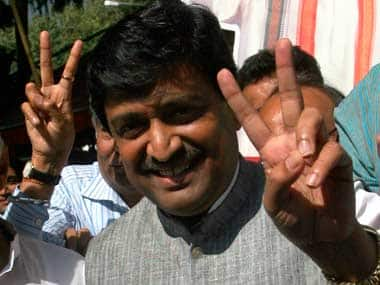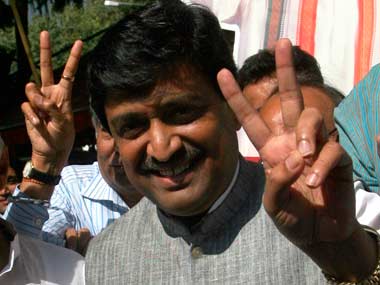Just when it seemed that Rahul Gandhi, apparently resigned to his party’s fate in the 2014 Lok Sabha elections, is focusing on party-building and preparations for a possible mid-term election, the Congress party invited ridicule as it appeared to set aside its vice-president’s anti-corrruption agenda in giving a Lok Sabha ticket to former chief minister Ashok Chavan who had to resign in 2010 under a cloud of suspicion over the Adarsh Society scam. [caption id=“attachment_1347017” align=“alignleft” width=“380”]  Ashok Chavan. Reuters.[/caption] For the record, the Congress’s argument on Chavan’s candidature is that unlike Suresh Kalmadi who is still sulking after being refused a ticket from Pune, Chavan is not facing trial. Kalmadi was charged in the Commonwealth Games scam. Senior Congress leader Ajay Maken said on Tuesday that “no court or Election Commission has barred Ashok Chavan from contesting polls. His case is different from that of Suresh Kalmadi. While Kalmadi has been chargesheeted, court has not taken cognisance of the case against Chavan”. This is, of course, a technicality. The facts are that Ashok Chavan was handling the Urban Development portfolio during his chief ministership. When the CBI sought state sanction to prosecute him, the agency said it had enough evidence. Its contention against Chavan pertained to his approving additional Floor Space Index (FSI). A quid pro quo was alleged as his relatives have flats in the building. But beyond the CBI’s contention, there are perceived acts of omission that the Congress will no doubt hear repeatedly from its opposition in coming days: That the building was coming up at a rapid pace on prime property in South Mumbai, with flats at ridiculously low prices overlooking the sea, was known to all. At least one major newspaper had already reported that there appeared to be serious violations. Among the political class too, the rush to find somebody who could help obtain membership to the society was an open secret – the membership list grew rapidly and even the judicial commission report confirmed that some 20-odd members, mostly relatives of politicians and bureaucrats, appeared ineligible. In spite of these circumstances, the Congress party, and Rahul Gandhi, have chosen to rest on a technicality their contentious case for candidature to the former chief minister. But this decision has been in the pipeline for several months now. Earlier this month, Chavan and Gandhi shared the stage at a rally in Aurangabad, Maharashtra. At one point, Chavan walked up to Rahul and the two shook hands, smiling, as Maharashtra Congress chief Manikrao Thakre and Chief Minister Prithviraj Chavan looked on awkwardly. Thakre has been for some months now reiterated that the Congress in Maharashtra, fighting a double anti-incumbency, desperately needs Ashok Chavan’s skills as a campaigner, deal-maker and election strategist. Several sections of the state Congress have pitched for his candidature, while he himself let it be known that he was comfortable with his wife Ameeta being given the ticket. Ameeta, in fact, reportedly filed her nomination papers in Nanded yesterday, apparently as ample precaution. Chavan’s political rehabilitation was inevitable. The Maharashtra Pradesh Congress Committee is beseiged with complaints of the party favouring newcomers (from ministers like Narayan Rane to MPs like Sanjay Nirupam) over original Congressmen, the lack of respect to Maharashtrians (not one of Mumbai’s five Congress MPs is a native of the state) and over the vacant posts that mid-level Congress leaders aspire to, including to the executive bodies of state-run corporations, special executive officers, etc. In addition, with the demise of Vilasrao Deshmukh, the Congress sorely lacks a pan-Maharashtra leader with charisma and a large mass base who can address rallies in Marathi. Thakre is himself a member of the state legislature’s upper house, and so is Prithviraj Chavan, who was earlier a Rajya Sabha member and has no traditional mass support base even in his home constituency in Satara. Chavan’s candidature gives fodder to the party’s critics, not just for the Lok Sabha elections but for the Maharashtra Congress’s more critical attempt to keep power in Maharashtra in the Assembly elections coming up in October. Possibly a case of something the Congress can’t spit, can’t swallow.
The contentious decision has been in the making for several months with the Maharashtra Congress chief making it clear that the party needs the former chief minister’s skills as a strategist and campaigner.
Advertisement
End of Article


)
)
)
)
)
)
)
)
)



